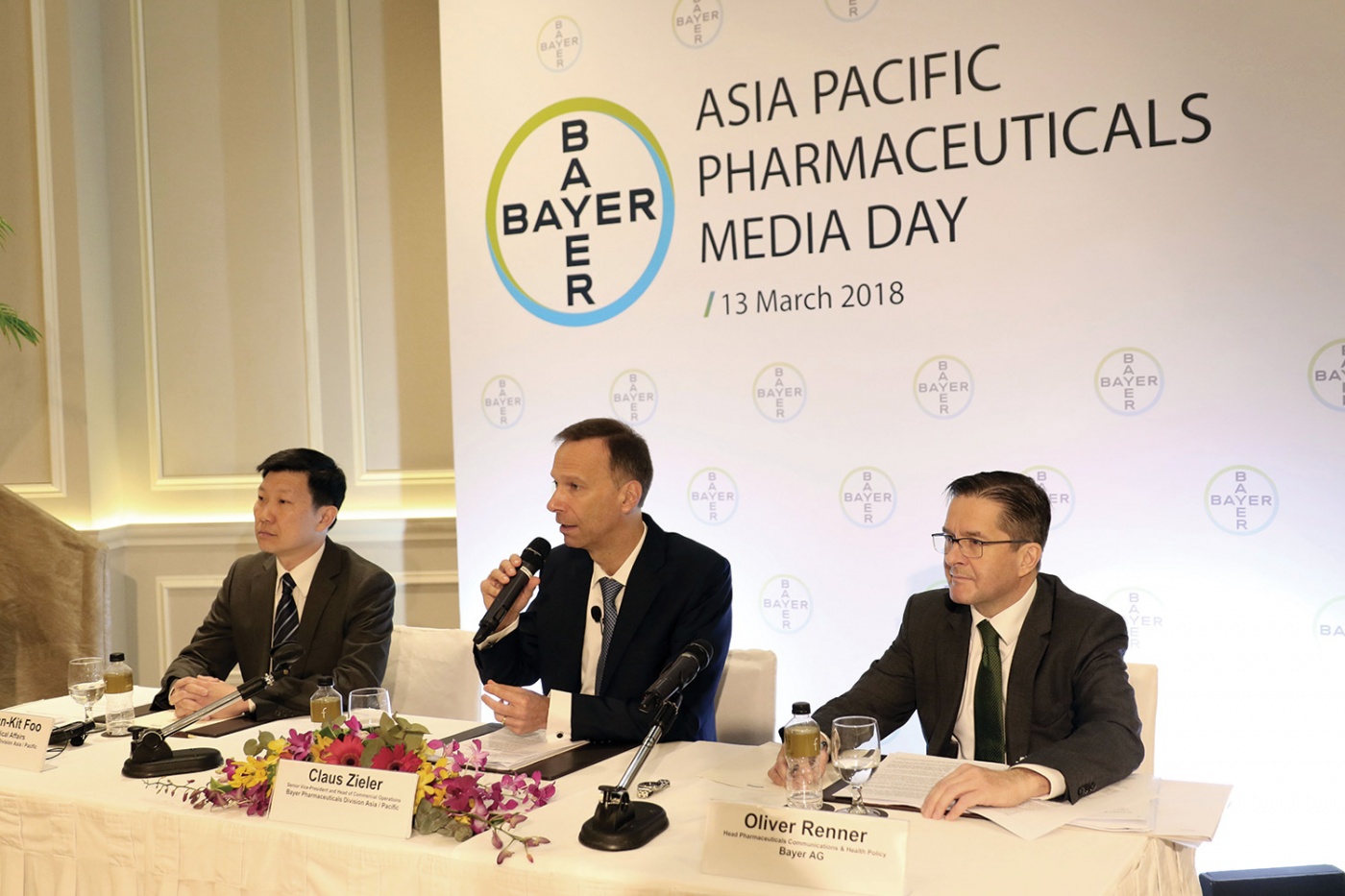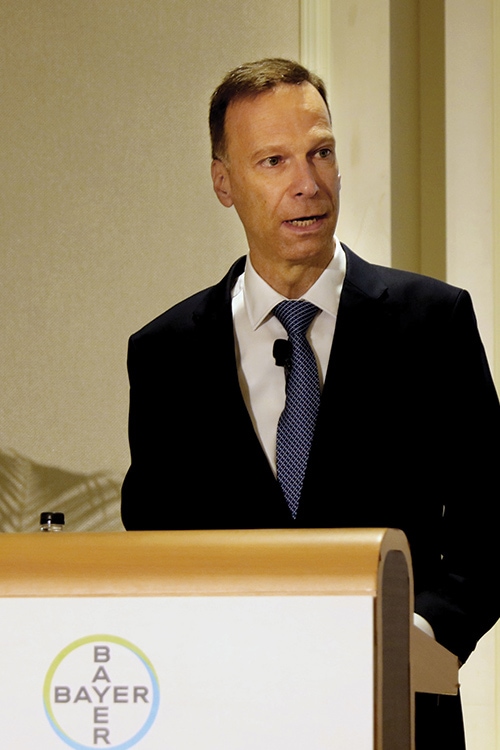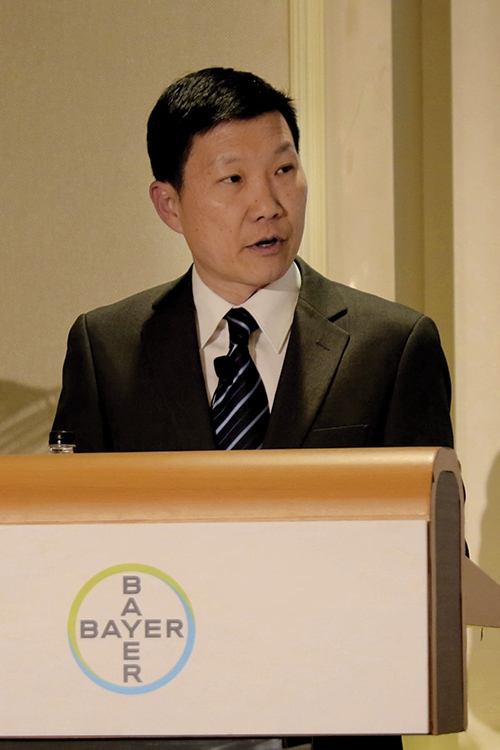Bayer Achieves Seventh Straight Year of Growth for its Pharmaceuticals Business in Asia-Pacific
Last Tuesday, Bayer reported another successful year for its Pharmaceuticals division in the Asia-Pacific region. On a currency adjusted basis, sales grew by 8.5 percent to more than €5.0 billion, making Asia-Pacific the fastest growing region for Bayer’s Pharmaceuticals sales in 2017. Sales in the region contributed about 30 percent of the division’s global sales, which is the second largest contributor among all regions. This is the seventh consecutive year of robust growth for Bayer’s Pharmaceuticals Division in Asia-Pacific, with sales nearly doubled from over €2.6 billion in 2010 to about €5.0 billion in 2017.
Innovative products such as the oral anticoagulant Xarelto® (Rivaroxaban), eye medicine Eylea® (Aflibercept) and oral cancer treatment Nexavar® (Sorafenib) are key products in the region. Mr. Claus Zieler, Senior Vice President and Head of Commercial Operations, Bayer Pharmaceuticals Division Asia-Pacific, said: “We are pleased with our solid performance in Asia/Pacific, which makes the region the biggest growth driver for our Pharmaceuticals business in 2017. Our innovative medicines provide solutions to the region’s major health challenges such as stroke, cancer and eye diseases related to aging and diabetes. We are heartened to see they continue to be well received by doctors and patients year after year.”
Many of the region’s markets delivered strong growth rates in 2017 as compared with 2016. These include Australia (~10%), China (~14%3), Korea (~10%3), Taiwan (~16%3) and Thailand (~11%3). According to global health intelligence agency IMS 2017 data, Bayer’s Pharmaceuticals business continued to be one of the fastest growing among top pharmaceutical multinational companies in the region.
In 2018, Bayer plans to generate sales of more than €16.5 billion for its Pharmaceuticals division globally. The division aims to raise sales of key growth products including Xarelto® and Eylea® among others toward €7 billion. Asia/Pacific continues to present growth opportunities, as IMS predicts an average market growth rate of 4.3 percent across the region from 2018 to 2021.
Strong Uptake of Innovative Medicines in Asia/Pacific
In 2017, Xarelto® and Eylea® once again achieved double-digit sales growth globally. The uptake of both products in Asia/Pacific markets continued to rise sharply.
Xarelto®, the most broadly indicated non-vitamin K antagonist oral anticoagulant (NOAC) worldwide with the most patients treated than any other NOACs for blood clot prevention and treatment, has been prescribed to around 36 million patients worldwide and around five million patients in Asia/Pacific for the management of blood clots in seven distinct indications across the venous and arterial thromboembolic (VAT) space. By the end of 2017, Xarelto® recorded sales of close to 30 million packs in the region.
Eylea®, the Anti-VEGF eye treatment has been administered in more than 18 million doses to patients globally for the treatment of several retinal disorders in five distinct indications including wet age-related macular degeneration (wAMD) and visual impairment due to diabetic macular edema (DME). Over 2.5 million doses of Eylea® have been administered to patients in Asia/Pacific.
Nexavar®, one of the company’s successful cancer therapies continued to show strong uptake in the region. Over one million packs of Nexavar® have been delivered to patients in Asia/Pacific for treatment in its approved indications including late-stage liver cancer (hepatocellular carcinoma, HCC), advanced kidney cancer and differentiated thyroid cancer from 2010 to 2017.
Nexavar® is widely used as a standard first-line treatment of HCC. In 2017, Bayer expanded its leadership in HCC with the approval for Stivarga® (Regorafenib) in second-line treatment, after sorafenib in the US, Europe and Asia/Pacific countries including Australia, Korea, Taiwan and the Philippines. Approvals are based on data from the Phase III RESORCE study where regorafenib demonstrated significant improvement in overall survival (OS) in HCC patients previously treated with sorafenib i.e. the median time from the start of prior sorafenib treatment to death was 26 months in patients receiving regorafenib versus 19.2 months in those receiving placebo.
“East Asia has one of the world’s highest incidence rates in HCC. The data brings new hope to patients in the region who previously had no effective treatment options after being treated with Nexavar. They will have for the first time a treatment plan involving the consecutive use of both approved treatments which will further extend their lives. This underscores our commitment to bring to patients innovative solutions with added value compared to standard therapy in diseases with a high medical need,” said Dr Chuan Kit Foo, Head of Medical Affairs, Bayer Pharmaceuticals Division Asia/Pacific.
Additional regulatory filings for Stivarga® in HCC are under review in countries around the world and in Asia/Pacific.
R&D Focus on Cardiovascular Disease and Cancer-related to Aging Population
The demand for innovative medicines is set to increase with the aging population in Asia/Pacific. According to the World Health Organization, over 87% of the burden of disease for older adults is due to non-communicable diseases (NCDs) – conditions such as cardiovascular disease and cancer, among others that typically manifest later in life. Cardiovascular disease (CVD) is the leading cause of death in the world and half of the cases of CVD are estimated to occur in Asia. Asia also accounts for half the global burden of cancer. The incidence of cancer cases in Asia is estimated to reach 10.6 million in 2030.
In 2017, Bayer increased its global R&D investments to nearly €4.5 billion—64.1 percent of the R&D investment is in pharmaceuticals. Bayer’s pharmaceuticals pipeline is well-stocked with about 50 development projects in Phase I to III of clinical development to serve such medical needs. Among these projects, six of them (in the mid to late stage pipeline) will have potential to treat various types of cancers, diabetic kidney disease, chronic heart failure and uterine fibroids which are prevalent in the Asia-Pacific population.
In addition to new drug candidates, Bayer conducts studies with its launched products to further expand their spectrum of indications. In 2017, Bayer announced results of the COMPASS study which investigates the benefit of Xarelto® in patients with chronic coronary artery disease (CAD) or peripheral artery disease (PAD). The study showed that addition of rivaroxaban 2.5mg twice daily to aspirin 100mg once daily significantly lowered the combined risk of stroke, cardiovascular death and heart attack in patients with chronic coronary or peripheral artery disease by 24%.
In the field of cancer, Bayer has entered into an exclusive global collaboration with Loxo Oncology, Inc., a U.S. biopharmaceutical company, to develop and commercialize two novel oncology therapies selectively targeting genetic drivers of cancer. With the collaboration of Loxo Oncology, Bayer’s oncology pipeline will make a meaningful difference for patients suffering from various types of cancer.
Bayer has ensured that the Asia-Pacific population is well represented in its clinical development activities. It has systematically recruited patients from the region as part of its global clinical trials. The number of ongoing clinical trials conducted has more than doubled from 21 in 2007 to 53 in Asia-Pacific in 2017, out of which 22 of them are conducted in Singapore.
“By involving Asia/Pacific patients in our clinical development activities, we can provide patients with earlier access to potentially better treatments to address their unmet medical needs,” said Dr Chuan Kit Foo, Head of Medical Affairs, Bayer Pharmaceuticals Division Asia/Pacific.
Collaboration is Core to Solving Healthcare Challenges in Asia-Pacific
Bayer embraces different forms of collaboration—from traditional licensing partnerships and strategic research alliances with companies and academia to new models of open innovation involving entrepreneurs, start-ups and young researchers. In November 2017, Bayer celebrated its ten years of partnership with Singapore institutions in clinical and translation research in cancer and heart diseases with the support of the Singapore Economic Development Board (EDB). The collaboration was set up to jointly find solutions to diseases which are prevalent in Asia. Bayer has to date invested S$27 million in projects under this collaboration.




